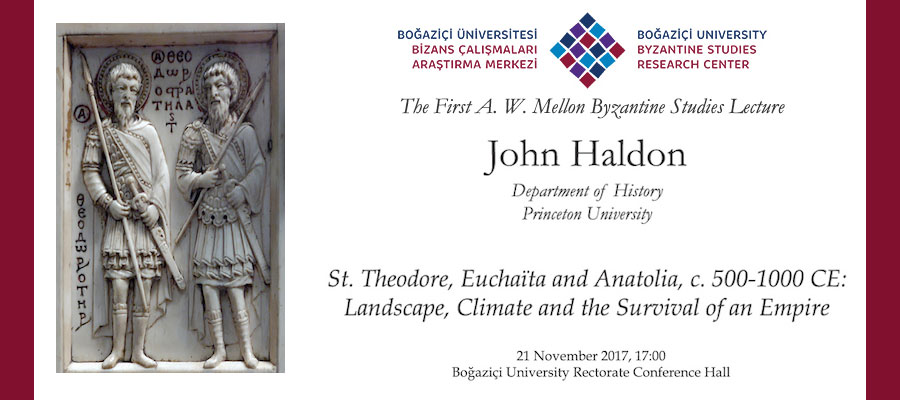St. Theodore, Euchaïta and Anatolia, c. 500-1000 CE: Landscape, Climate and the Survival of an Empire, lecture by John Haldon (Princeton University), Boğaziçi University, November 21, 2017, 5:00 pm
The Byzantine Studies Research Center at Boğaziçi University presents The First A. W. Mellon Byzantine Studies Lecture to be given by Prof. John Haldon from the Department of History, Princeton University. The lecture entitled “St. Theodore, Euchaïta and Anatolia, c. 500-1000 CE: Landscape, Climate and the Survival of an Empire” will take place at the Rectorate Conference Hall, Boğaziçi University, on 21 November 2017, 5:00 PM.
John Haldon is Shelby Cullom Davis '30 Professor of European History, Professor of Byzantine History and Hellenic Studies, and Director of the Mossavar-Rahmani Center for Iran and Persian Gulf Studies. He has been Director of Graduate Studies for the History Department since July 2009. His research centers on the socio-economic, institutional, political and cultural history of the early and middle Byzantine empire from the seventh to the eleventh centuries. He also works on political systems and structures across the European and Islamic worlds from late ancient to early modern times, on the environmental history of the Byzantine and Ottoman worlds and the interface between societal change, environment and climate, and has explored how resources were produced, distributed and consumed, especially in warfare, during the late ancient and medieval periods. Professor Haldon is the author and co-author of more than two dozen books. His most recent books are The empire that would not die:The paradox of eastern Roman survival, 640 – 740 (Harvard UP, Cambridge MA 2016), A tale of two saints: the passions and miracles of Sts Theodore 'the recruit' and 'the general' (Liverpool UP, Liverpool 2016), A Critical Commentary on the Taktika of Leo VI (Dumbarton Oaks, Washington, DC 2014) and Byzantium in the Iconoclast Era: A History, with L. Brubaker (Cambridge University Press, Cambridge 2011).
